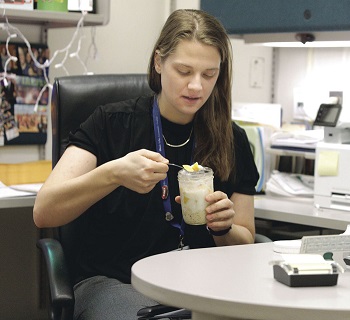Wake Up and Eat Up

Jheri Emmerling settles into work while eating her favorite breakfast, overnight oats. The Spring Valley woman decided about 16 months ago to quit skipping breakfast. This additional meal was part of her focus and health, and she has since lost about 55 pounds, Emmerling said.
Eating breakfast. Many of us don’t. A widely cited study from 2011 showed one in 10, or about 31 million Americans, skip breakfast.
More and more, we’re told this is a bad idea. It is an unwise weight loss strategy and could be a road to other health problems, medical professionals say.
A study published in October in the peer-reviewed Journal of the American College of Cardiology — “The Importance of Breakfast in Atherosclerosis Disease: Insights from the PESA Study” — concluded that skipping breakfast is a frequent and unhealthy habit associated with increased cardiovascular risk. PESA stands for progression of early subclinical atherosclerosis.
Researchers underscored that the study does not necessarily mean skipping breakfast causes clogged arteries. Rather, skipping breakfast is a habit of people with health problems including atherosclerosis.
“We’ve known for years that eating breakfast is healthy and this adds more confirmation to that claim,” said Alyssa Salz, dietitian at Illinois Valley Community Hospital, Peru.
Many patients with other health problems also happen to skip breakfast, she said.
“That’s really common in overweight or obese or diabetic patients,” Salz said. “People that skip breakfast overall have an unhealthy lifestyle. Most of them, it’s that they’re busy and they don’t have time for breakfast.”
Those who try to lose weight by skipping breakfast often turn to unhealthy eating later in the day, Salz said.
“When you skip breakfast, if you’re not eating until the afternoon, then you’re overly hungry and that doesn’t put you in a healthy place to make healthy choices. You’re going to grab whatever looks good.”
In August of 2016, already focused on being healthier, Jheri Emmerling began examining her diet. She worked at Illinois Valley Community Hospital, so she brought Salz a list of what she was eating.
“I was struggling a little bit,” Emmerling said. “At the time, I didn’t really have a plan for breakfast. Sometime since high school, I didn’t really consider breakfast a huge deal.”
Emmerling, 27, of Spring Valley got some advice, including the necessity of eating breakfast. In the last 16 months, Emmerling has lost 55 pounds,
“Since I’ve started eating breakfast, I am less hungry at lunch, so I don’t overeat,” she said. “I feel like I’m more focused on my work because I’m not wondering ‘when am I going to eat?’ I kept a food log. I stopped wanting to get chocolate or chips.”
Salz said breakfast should be high in nutrients and low in sugar, salt and saturated fat.
“If somebody is eating sugary cereal with whole milk and bacon and sausage, that’s not going to be a smart choice for your artery health, your heart health and overall health,” Salz said.
Processed, cured and smoked meats are generally less healthy, she said. Eggs remain controversial, she said.
“The general consensus for people with heart disease risk is three times a week, one egg each time. The research goes back and forth on that.”
Emmerling’s go-to breakfast became vegetable juice and overnight oats. She places oatmeal, milk and yogurt in a glass jar, sticks it in the fridge the night before, adds fruit and takes it with her out the door.
“It’s one of those small changes you can make,” she said.
Emmerling trimmed her 5K run times from 32 minutes down to 26.5 minutes, Emmerling said. “Every pound you lose, you gain so many seconds. It has increased my energy,” she said.
She also is the freshman girls basketball coach at St. Bede.
“When I do drills, I feel I can do more because of the weight loss,” she said.
Salz said patients who start eating breakfast report good results.
“Most people feel like they have more energy throughout the day,” Salz said. “Diabetes patients’ blood sugar normalizes. Their weight starts to decrease. They’re making changes that are doable. Often times you’ll see they are eating more fruits and vegetables.”
TROPICAL OVERNIGHT OATMEAL
Breakfast is a snap with a quick step the night before. The next morning, add bananas, pineapple and almonds.
Servings: 2
Prep time: 5 minutes
- 2/3 cup old fashion oats (uncooked)
- 1 cup fresh pineapple, diced
- 2/3 cup non-fat milk
- 1 medium banana, sliced
- 2/3 cup non-fat Greek yogurt
- 2 tablespoons nuts
- 1/8 teaspoon ground allspice
- Mix oats, milk, yogurt and allspice in two bowls or glass jars.
- Cover and refrigerate overnight. Just before serving, add pineapple, banana and almonds.
Nutrition information per serving: 338 calories, 7 g fat, 1 g saturated fat, 3 mg cholesterol, 76 mg sodium, 54 g carbohydrates, 7 g dietary fiber, 23 g total sugar, 0 g added sugar, 19 g protein, 1 mg vitamin D, 249 mg calcium, 2 mg iron, 727 mg potassium.
Story Credit: http://www.newstrib.com/free/skipping-breakfast-associated-with-unhealthy-lifestyle/article_40e5586c-f6e4-11e7-b294-f3c36b7a16e3.html


